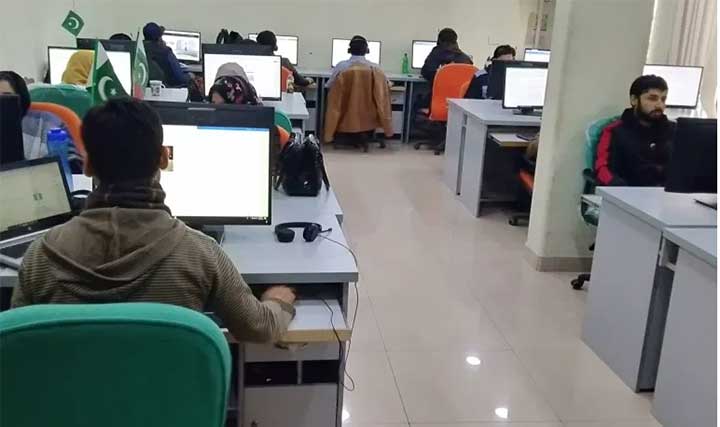By: Hamza Khan
Wisdom Inspiration and Aspiration are written on the door of every university but if it is damaged inside, it is prepared only for high grades. Herbert Spencer British Sociologist said that the great aim of education is not knowledge but action. The Higher Education Commission (HEC) has revealed in a very disturbing report that more than 4000 Ph.D. scholars are unemployed. On the other sides, the purpose of research is to minimize or solve the problem of society, but in our education system research is only conducted for the degree and promotion. Without any effectiveness in any sector of life is the drawback of education sectors in society. According to the economic survey of Pakistan, the literacy rate in 2022 province-wise for males and females has improved by 58 percent to 70 percent. Now, about 22 million students are having easy access to schools and colleges. Pakistan’s literacy rate’s latest figure is 72.5 percent for males and 51.8 percent for females. The Economic Survey of Pakistan nevertheless shows that the literacy rate is at a static point.
The Pakistan Institute of Development Economics (PIDE) revealed that over 31 percent of Pakistan’s teenagers are presently unemployed and of this figure, fifty-one percent are females, at the same time as sixteen keeping with percent are men, with a lot of them conserving expert levels. There are myriads of socio-psychological side effects of unemployment, but depression, frustration, and emotional disorders are the most pathetic ones. As per reports, there are 136 humans who committed suicide in Pakistan only within 12 months, just because they had been unemployed. That unemployment is so high in Pakistan demonstrates the incapacity of the management to efficiently deal with the underlying causes of the trouble.
Nowadays, the country of Pakistan’s institutions of governance stays negative, as illustrated using a slew of measures. The World Bank Report based totally on information from 2021, ranks Pakistan in the 119 percentiles for government effectiveness, with a rating of 48.4. The current United nations development program Human development index focuses on the Youth as an essential force for shaping human improvement, due to the fact Pakistan presently has the largest number of youths ever in its records, with approximately thirds of the full population below 30 years of age. As we know that Pakistan has a large population of youth which is called a youth bulge, but the question arises here, whether this youth bulge is a blessing or a curse. This ‘youth bulge’ can be both a dividend or a catastrophe for the nation if Pakistan invests in teens using imparting them with fine training, first-class employment, and meaningful engagement possibilities. However, it is imperative to invest in the kids now, these days, while they may be teenagers; no longer best to enhance the private well-being of the youth but additionally to enhance the country’s human improvement.
Theoretically speaking, Meritocracy according to Sociologists like Davis, and Moore that in a meritocratic society the training device turns into the first-rate mechanism for selecting the proper people for the right jobs function allocation. Meritocracy is the belief that people have to and are duly presented via society for their tough paintings and efforts, those that work tough will and might gain those that select now not to acquire their due rewards. Meritocracy describes a society wherein jobs and pay are allotted primarily based on an individual’s skills and achievements instead of social repute. But in Pakistan, there is a sorry state over meritocracy and role allocation. Neither the government’s institutions are functioning that way as it is required to engage the youth and its potential. In this regard, the education sector plays a vital role in properly ensuring meritocracy. Similarly, education institutions along with the industrial sector can help a state with the purpose of lessening the socio-psychological and economic problems among youth.
Furthermore, in the developed world, Individuals that work hard may be rewarded in society. The education sector of those countries is closely connected with the job market and prepares the student as per the requirement of the time. In Pakistan, the skills have completely ignored the student is just like a docile body depends on the work of others. The need for skills with credentials is to improve the system. Of direction, one detail that is ascribed rather than carried out: herbal potential, expertise, or intelligence. but this is fair and the way it needs to be and has nothing to do with the circle of relative’s heritage, gender, ethnicity, and so on.
All over the world, the effectiveness of the Institutions mainly depends on the outcome of the education system, but regrettably, in Pakistan, the education system is based on Credentialism instead of Meritocracy. Credentialism, as a social phenomenon, refers to reliance upon formal credentials conferred through instructional establishments, professional groups, and other institutions as a most important method to decide the qualifications of people to carry out a range of occupational tasks or to make authoritative statements as “experts” in particular difficulty areas. In the developed countries the credentials plus Meritocracy both are in consideration, and individuals have required the proper skills for the given job. But here the dilemma credentials as only the source for achieving a position in the country. From this perspective, the disguised cause of a good deal of formal schooling (its “hidden curriculum”) is to impart a specific disciplinary paradigm, ideological orientation, or set of values to those looking for formal credentials to work in prestigious or “high status” fields including medicinal drug, law, and training, and Policies making.
The “credential inflation” that passed off during the last 1/3 of the 20th century changed into a product of the outstanding expansion in postsecondary education that fulfills most of the extra developed commercial of “post-industrial” societies within the World War
The corollary to this phenomenon is that many people regard themselves as overqualified for the jobs they perform and enjoy administrative center dissatisfaction stemming from the belief that many of the highbrow abilities they attained through “higher education” are being underutilized or even wasted. Today Pakistan is confronting the problem of credential Inflation due to which most of the Institutions move towards failure day by day, showing the low effectiveness in all walks of life which is one of the dangerous threats to present society. Higher Education needs to ensure the quality base research to provide solutions to the present problems and redesign the curriculum to prepare the skilled student for the job market.
The writer is an MPhil Scholar at the Department of Sociology, Quaid-i-Azam University, Islamabad and can be reached at [email protected]



